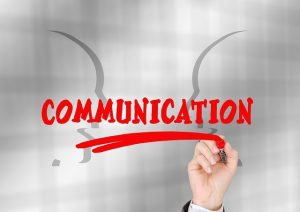Become A Better Communicator: The Top 7 Tips
 Communication is both art and science.
Communication is both art and science.
The artful aspect of it involves using your own personal style and personality to shape the way you express yourself. It also involves the way you can make others feel when they express themselves to you.
The scientific aspect of communication involves understanding the important components that go into the entire process. If you want to communicate effectively, whether you are talking with just one person or many, you would be wise to employ these skills.
The Top 7 Tips to Improve Communication
I have compiled what I consider to be the top 7 tips to becoming a better communicator. Learning to use these tips can help to greatly improve your relationships.
1) Listening:
This may seem obvious so why is it so hard to do? The truth is that most of us do not listen well, especially to someone with whom we disagree.
We tend to occupy our minds with forming a response so we can jump in and make our point. We look to direct the discussion our way so we listen for cues to do so. We may feel we need to defend ourselves or create a distraction in order to diffuse the other’s point.
This communicates to the listener that we aren’t really interested in what they have to say and, as a result, the conversation may end badly.
2) Managing Emotions:
Emotions drive the way you look, behave and respond.
To be a better communicator you need to be in touch with your emotions and not let them rule you in a discussion. It is often the way you feel, more than the way you think, that determines how you will communicate or make decisions.
Poor emotional control can lead to negative nonverbal cues that cause unwanted reactions from the other person. Emotional awareness is a skill you can acquire. It takes practice to curb your tendency to react emotionally or over react.
3) Acknowledging:
To acknowledge is to let the other person know that you understand them.
Obviously if you were not truly listening you will not be able to acknowledge what you heard and convince the other person that you understand their point of view. Everyone wants to be understood and acknowledged.
Bear in mind that this point, acknowledgement, is crucial because it is also an indication of respect for the other person.
4) Not Interrupting:
Avoid interrupting at all costs. It shows that you have not been able to control your emotions and that you have little regard for the other’s point of view. It gets back to the issue of not being able to listen effectively.
Why would anyone want to hear what you have to say if you have not given them the chance to make their point.
5) Observing And Mirroring:
Remember that body language, physical cues and tone are often more important than words. If you are paying attention you will recognize these cues and make a better interpretation of the message the speaker really wants to impart.
Mirroring is a communication technique that helps convey your intention to connect with the other person. Simply stated, you may position your body to reflect their body position or even use a similar tone as they use when speaking.
This technique can be used in many different settings and is effective in communicating interest.
6) Questioning:
Find out more about what the other person is saying by asking a question (or questions). Do not take for granted that you already know for sure what they are meaning to convey.
By controlling your emotions and carefully listening you are already engaging the other.
However, gaining clarity by asking a good probing question to find out more and then asking if you are correct in what you are hearing is stepping up your skill to yet another level.
7) Staying Aware:
We communicate through our body language more so than we do through the spoken word. Facial expressions, eye contact and the way we sit, stand or move our arms, hands and legs say more to the other person than the words we choose.
You can wring your hands, look to the side and away from the other person, roll your eyes, cross your arms and lean back or even distort your face with a dismissive look.
You might do these gestures without thinking or being aware of the effect it is having.
However, to have better communication you must always be aware of your body language. Lean forward a little and focus on the other person. Keep yourself open and attentive.
Control your tone so that you can emphasize your important points without causing them to be rejected as accusatory or offensive.
Couples complain about poor communication more often than almost any other issue in their relationship.
Raise your game by improving your communication skills.
Other articles of interest:
Being Critical? Are You Helping or Hurting?
The Tope 10 Tips For Creating A Great Relationship
Making Amends For Bad Behavior
About the Author
Dr. Stan Hyman is a licensed psychotherapist and life coach in private practice in Miami, Florida. He works with individuals, couples and business partners helping them to improve their communication skills and resolve conflict.
